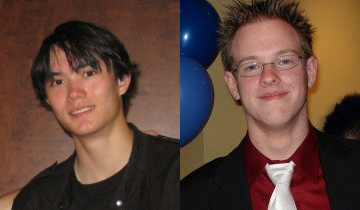|
Starting in 2008, in the spirit of Steven Halim's World of Seven: Methods to Solve website (a site that posted solutions to hundreds of problems for the
University of Valladolid (UVa) Online Judge website), we decided to post our own answers that we found for each problem. This was in the hope that our repository of solutions could be as
great an informational resource to programmers everywhere as Steven's was. Many years have passed since then, Wesley lapped Peter 2x in that time, and now both Wesley and Peter make money with real jobs and aren't up to fix the site with each PHP update. Got a problem with the site? That's surprising, but send us an email anyway! contact@questtosolve.com |  |
|
| Peter: 204 problems solved | Wesley: 573 problems solved | |
| Some really old pictures of us. | ||